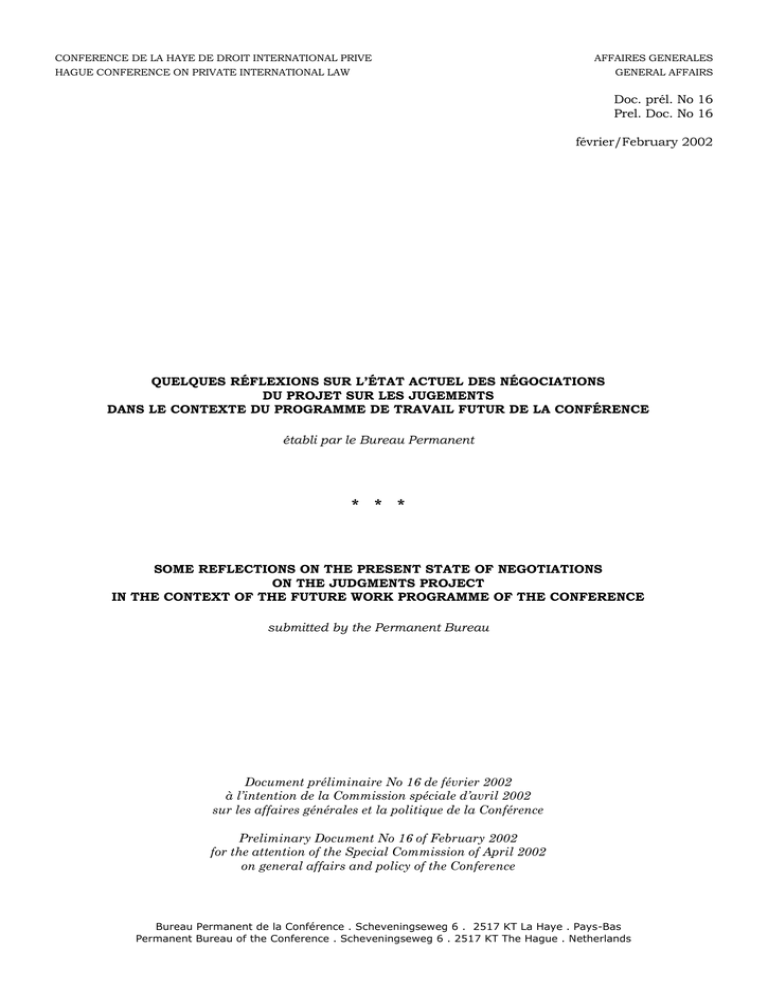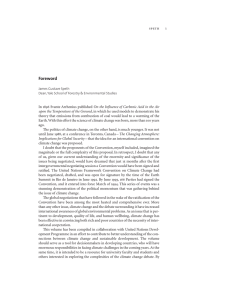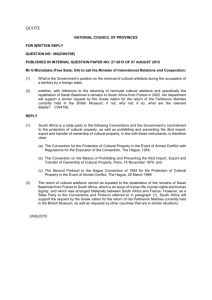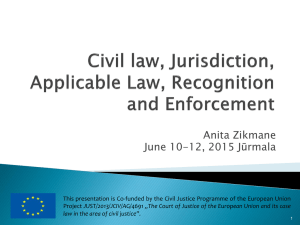Document 16077090
advertisement

CONFERENCE DE LA HAYE DE DROIT INTERNATIONAL PRIVE HAGUE CONFERENCE ON PRIVATE INTERNATIONAL LAW AFFAIRES GENERALES GENERAL AFFAIRS Doc. prél. No 16 Prel. Doc. No 16 février/February 2002 QUELQUES RÉFLEXIONS SUR L’ÉTAT ACTUEL DES NÉGOCIATIONS DU PROJET SUR LES JUGEMENTS DANS LE CONTEXTE DU PROGRAMME DE TRAVAIL FUTUR DE LA CONFÉRENCE établi par le Bureau Permanent * * * SOME REFLECTIONS ON THE PRESENT STATE OF NEGOTIATIONS ON THE JUDGMENTS PROJECT IN THE CONTEXT OF THE FUTURE WORK PROGRAMME OF THE CONFERENCE submitted by the Permanent Bureau Document préliminaire No 16 de février 2002 à l’intention de la Commission spéciale d’avril 2002 sur les affaires générales et la politique de la Conférence Preliminary Document No 16 of February 2002 for the attention of the Special Commission of April 2002 on general affairs and policy of the Conference Bureau Permanent de la Conférence . Scheveningseweg 6 . 2517 KT La Haye . Pays-Bas Permanent Bureau of the Conference . Scheveningseweg 6 . 2517 KT The Hague . Netherlands QUELQUES RÉFLEXIONS SUR L’ÉTAT ACTUEL DES NÉGOCIATIONS DU PROJET SUR LES JUGEMENTS DANS LE CONTEXTE DU PROGRAMME DE TRAVAIL FUTUR DE LA CONFÉRENCE établi par le Bureau Permanent * * * SOME REFLECTIONS ON THE PRESENT STATE OF NEGOTIATIONS ON THE JUDGMENTS PROJECT IN THE CONTEXT OF THE FUTURE WORK PROGRAMME OF THE CONFERENCE submitted by the Permanent Bureau 4 INTRODUCTION 1 From 6-22 June 2001, the Hague Conference on Private International Law met during a two and a half week long Diplomatic Session that was to be the first part of a negotiation to be conducted in two stages on a Convention on jurisdiction and the recognition and enforcement of foreign judgments in civil and commercial matters (the "Judgments Convention"). After the Commission charged with the negotiations on this project (Commission II) had terminated its work,1 the Commission on general affairs and policy (Commission I) met to discuss the future of the Judgments Project. While the delegations confirmed their dedication to the project in principle, it was decided that the Second Part of the Diplomatic Session could not be held before the end of 2002 and that Commission I should meet again early in 2002 to thoroughly examine the nature and state of the conditions for a successful conclusion of the negotiations. Member States were encouraged to find a way in which to approach issues on which a broad consensus has not yet emerged, consider the manner in which negotiations might be conducted, and determine an appropriate schedule for any future negotiations. 2 With a view to exploring the prospects for future negotiations, since June 2001 several countries as well as the European Community have held hearings on the proposed Judgments Convention, and bilateral consultations have taken place. It may be assumed that much of the ongoing discussion has revolved around the difficulties relating to activity based jurisdiction, intellectual property, consumer rights and employee rights, among others. More general themes will have been the impact of e-commerce on the negotiations and whether a more limited Convention should be considered as was proposed by some delegations during the First Part of the Nineteenth Session.2 3 This Note will take no position on the ultimate breadth of the substantive scope of the Convention - that is for the Member States to decide at the next meeting of Commission I which has been scheduled for 22, 23, and 24 April 2002. Rather, its concern is to assist Member States – including the many States which joined the Conference recently and which have not been able to participate fully in the negotiations thus far 3 – in determining a constructive method of proceeding and the possible timeframes involved, these latter being dependent upon choices to be made with regard to the scope of the Convention. Given the limited resources of the Conference, it is critical that decisions on the way to proceed with this project also take into account the work programme for other topics currently underway, based on decisions taken in June 2001. In this regard, attention is drawn to the tentative time schedule attached to this Note in Annex I. 4 This Note assumes that the Judgments Project, despite the difficulties manifest from the Interim Text, is no less important now, indeed that it is probably more important, than when, almost ten years ago, a working group of the Hague Conference unanimously agreed "on the desirability of attempting to negotiate through the Hague 1 See Summary of the Outcome of the Discussion, in Commission II of the First Part of the Diplomatic Conference, 6-20 June 2001, Interim Text, prepared by the Permanent Bureau and the Co-reporters (ftp://hcch.net/doc/jdgm2001draft_e.doc). 2 See, in particular, Commission II Working Document No 97 (E&F) of 18 June 2001 submitted by the delegations of Argentina, Australia, New Zealand and Norway. 3 During the year 2001, ten new States joined the Hague Conference on Private International Law: Peru, Brazil, Belarus, Georgia, Yugoslavia, Jordan, Bosnia and Herzegovina, Sri Lanka, Lithuania and the Russian Federation. 5 Conference a new general convention on jurisdiction and recognition and enforcement of judgments".4 There is little doubt that one of the factors which has recently attracted so many new Member States to the Organisation is their interest in this project. The ongoing globalisation of trade and commerce, and the exponential growth of the use of the Internet and e-commerce continue to add to the need for a global framework for jurisdiction and the recognition and enforcement of judgments. THE ISSUES 5 It would seem that, at the end of the June Session, there were at least six major areas, in respect of which a lack of consensus creates obstacles to progress: A B C D E F the Internet and e-commerce; activity based jurisdiction; consumer contracts (in particular Article 7) and employment contracts (in particular Article 8); patents, trademarks, copyrights and other intellectual property rights (Articles 12 and 10, among others); the relationship with other instruments on jurisdiction and recognition and enforcement of judgments, in particular regional instruments, more particularly the Brussels and Lugano Conventions and the Brussels Regulation (see Annex I to the Interim Text); bilateralisation (Article 42). While all of these areas are interrelated, they do not necessarily affect the future Convention in the same manner. For example, some affect the structure of the Convention as a whole (E, F); on others there has been a debate (but no agreement) that they might be treated in a special way (C, D). The difficulty in resolving the issues surrounding activity-based jurisdiction (B) is matched only by its critical importance in negotiating a mixed convention. Finally, the Internet and e-commerce (A) deserve special attention because of their two-fold impact on the Judgments Project. On the one hand, the Internet environment adds to the complexity of the issues to be resolved in specific provisions; on the other hand, it reinforces the common need for a global framework on jurisdiction and recognition and enforcement in civil and commercial matters. 6 The expanding impact of e-commerce and the Internet is rapidly changing the environment in which any future worldwide instrument on jurisdiction and the recognition and enforcement of judgments in civil and commercial matters is going to operate. The accompanying Note, The Impact of the Internet on the Judgments Project: Thoughts for the Future, prepared for the Permanent Bureau by Ms Avril Haines, Temporary Legal Officer, describes how the Internet has become such a vital part of the economic and cultural development of Member States of the Conference that it can no longer be considered as only marginally relevant to the Convention. The paper also brings to light the complexity of the policy and technical issues which this new environment presents to the Judgments Project. Whatever one's perception of these difficulties, it is difficult not to agree with the paper’s conclusion that, as time goes on, the "pressure will only increase to obtain global solutions to the many problems faced by 4 See Conclusions of the Working Group meeting on enforcement of judgments, drawn up by the Permanent Bureau, Preliminary Document No 19 of November 1992 for the attention of the Seventeenth Session, in Proceedings of the Seventeenth Session, Tome I - Miscellaneous matters, pp. 257-263. It should be remembered that the decision to include the topic in the agenda with a view to negotiate a Convention was only taken – unanimously – by the Eighteenth Session, in October 1996, see Final Act D1, Proceedings of the Eighteenth Session, Tome I – Miscellaneous matters. 6 countries in their attempts to create a legal framework [adapted to] the Internet [and that it] is worth searching for solutions with regard to these many issues in order to support a rapidly developing global market place". The paper suggests that more work needs to be done, in the light of the Internet developments, on certain areas mentioned supra (No 5), i.e. activity based jurisdiction (B), the protection of weaker parties (C) and intellectual property rights (D).5 Consideration might be given to the possibility of combining the efforts of the Hague Conference and other international organisations, particularly with a view to exploring the policy issues identified in the paper (see infra No 12). 7 At the other end of the spectrum, there would seem to be a range of issues in the Interim Text on which there is agreement in principle or even agreement in detail. 6 A list of such issues would probably include (subject to further refinement) the provisions on scope, defendant's forum, choice of court in the business to business context, lis pendens and exceptional circumstances for declining jurisdiction along with most of the chapter on recognition and enforcement. At the same time, however, there is no current consensus as to whether a Convention confined to these issues - either as a first step or as a parallel effort with an attempt to resolve the more complex questions - would be of value. Moreover, even where agreement exists, it remains subject to the need to address the impact of e-commerce and the Internet, and to find solutions to these two unresolved structural issues: - the Convention’s relationship with other instruments (E); and the question of bilateralisation (F). 8 The approach so far has been, understandably, to reserve these general questions, including the impact of e-commerce and the Internet, for the end of the negotiation, on the assumption that they could be resolved once the "main body" of the Convention was "in order". One may, however, legitimately ask whether the importance and persistence of these issues is not such that their impact on the provisions of the Convention (those on jurisdiction, in particular) should be examined in close detail in the process of building the Convention. This may in turn have a bearing on whether it is preferable to negotiate one complete Convention with the full coverage of the 1999 Special Commission draft or perhaps to proceed in stages. This comment can be further elaborated as follows: 5 With respect to the latter issue it is worth observing that the WTO Council for Trade-related Aspects of Intellectual Property Rights (TRIPS) in its last Report of 4 December 2000 stated that "[t]he TRIPS Council continues to hold the view expressed in the Council's earlier Progress Report that the novelty and complexity of the intellectual property issues arising in connection with electronic commerce are such that continued further studies require the international community to better understand the issues involved." Paragraph 9 of document IP-C-20. 6 The working document submitted by the delegations of Argentina, Australia, New Zealand and Norway, supra fn. 2, attempted to identify areas upon which there exists at least a "near-consensus". The areas identified by this working document include scope, several jurisdictional provisions (defendant's forum, choice of court, branches, counterclaims) some prohibited grounds for jurisdiction, lis pendens and exceptional circumstances for declining jurisdiction along with most of the chapter on recognition and enforcement. 7 (1) Internet and e-commerce It has become apparent from both the Geneva roundtable and the Ottawa meetings that the additional difficulties which e-commerce poses, as far as determining globally acceptable grounds of jurisdiction is concerned, relate mostly to jurisdiction in disputes for which the parties have not taken the precaution of making a choice of court that is valid for the purposes of the Convention (sometimes referred to as "jurisdiction by default"). There was also wide agreement that the Internet and e-commerce should or could not be excluded from the Convention. Finally, Article 4 in particular seemed to be satisfactory for the purpose of electronic commerce i.e. for any clause appearing in a business to business contract concluded or performed electronically. It would seem to follow that the problematic impact of e-commerce and the Internet on the Convention concerns mostly Articles 6, 7, 8, 10 and 13 of the Convention, and to some extent, Article 9,7 but much less so other provisions of the Interim Text. (2) Relationship with regional instruments Annex I to the Interim Text contains no less than four proposals on the relationship of the future Convention with other instruments, in particular, the Brussels and Lugano instruments. No decision was taken on any of these proposals. In its Note on the relationship between the future Hague Judgments Convention and regional instruments, in particular the Brussels and Lugano instruments (Annex D to the Agenda of the experts' meeting (electronic commerce) held in Ottawa 26 February-2 March 2001), the Permanent Bureau suggested an approach which would seek to combine, to whatever extent possible, the advantages of the future Hague Convention and regional instruments such as the Brussels and Lugano instruments. In a globalising economy, the Note argues, litigants would be best off if they were to have the benefit of both the global and the regional instruments. The Note suggests that to the extent that there is an overlap between the Hague Convention and the Brussels and Lugano instruments, the solutions of Article 3 and 4 (and possibly 9) of the 1999 draft are much the same as those of the corresponding provisions of the Brussels/Lugano instruments, although there may be minor discrepancies. It may be worth trying to solve these issues before turning to the slightly more complicated questions which come up in the context of Articles 6-13. With regard to Articles 21 and 22 of the Interim Text (lis pendens and exceptional circumstances for declining jurisdiction), there should be no conflict except in cases where both courts are located in a State bound by the Brussels/Lugano instruments. A similar conclusion would apply to the provisions on recognition and enforcement of the Interim Text. (3) Bilateralisation Article 42 of the Interim Text includes alternative proposals for a provision dealing with bilateralisation. No decision was taken on this issue. Closer examination may, however, reveal that those States which favour the option of bilateralisation may be prepared to make certain exemptions, in particular, where parties have made a 7 In particular, the bracketed language of Article 9, about which there is no consensus, raises further questions, see accompanying Note, The Impact of the Internet on the Judgments Project: Thoughts for the Future. 8 choice of forum agreement in a business to business context.8 This question merits further study, because it may affect the structure of the ultimate instrument. 9 In summary, the articles of the Interim Text on which there may exist a technical consensus (see supra No 7) are also the provisions that (1) are not significantly affected by the Internet environment and that offer a starting point for an attempt to solve the thorny issues (2) of the relationship to regional instruments and (3) of bilateralisation. Whatever the choice to be made on the scope of the Convention (broad, as the 1999 draft, or more limited), there would seem to be merit in viewing this nucleus as the sensible departure point for future negotiation. Moreover, since bilateralisation may not be needed for choice of forum in the business to business context nor for the corresponding provisions on recognition and enforcement of judgments resulting from such a forum choice, within that nucleus Article 4 may be the appropriate starting point. In this context, the accompanying Note, Choice of Court Agreements in International Litigation: Their Use and Legal Problems to Which They Give Rise in the Context of the Interim Text, drawn up for the Permanent Bureau by Ms Avril Haines, discusses the significance of Article 4 of the Interim Text and examines in detail some outstanding issues relating to it which will need to be resolved. The Note suggests that reaching agreement on forum choice in the global context constitutes, as such, an important step, and would be a valuable tool for businesses engaging in cross-border transactions. 10 With this scheme as a beginning, the next step might be to examine if certain grounds of jurisdiction in the absence of a choice of forum clause (e.g. article 3) can be included in a non-bilateralised scheme or, if bilateralisation is considered desirable or unavoidable, how it should operate in respect of these grounds. As a further step, Articles 6-8 and 10 could be examined with a view to seeing whether there are aspects which are not, or not heavily, affected by the Internet environment such as grounds of jurisdiction based on the locus of physical injury or damage. This would, in all likelihood, open up the question of prohibited grounds of jurisdiction, about which there is, at this point, no full agreement. However, it might be that a step-by-step approach, and an analysis of Article 18 in the light of separate issues, could lead to new insights. 11 One advantage of this approach is that the discussion could focus initially on matters where there is basic agreement on policy considerations so that the preparatory work could be left to the care of a working group of experts in the field of jurisdiction and enforcement of judgments, which could convene, at low cost for the Organisation, in the Permanent Bureau. 12 Parallel with, or in close sequence to, the meetings of such a working group, consultations could continue on the implications of the Internet and e-commerce for the project. Since these consultations will also have to address policy issues, they may well require a different format, and some form of co-operation with other international organisations such as WTO, OECD and WIPO. Work could focus on three areas: jurisdiction for business to business contracts in the absence of a choice of forum clause; special rules for consumers and employees; non physical torts and intellectual property rights. 8 In this regard it is worth noting that contrary to the Hague Convention of 1 February 1971 on the Recognition and Enforcement of Foreign Judgments in Civil and Commercial Matters, the Hague Convention of 25 November 1965 on the Choice of Court (which, however, only provides for jurisdiction, not for recognition and enforcement of the resulting judgment) applies without such a restriction. 9 THE FUTURE WORK PROGRAMME OF THE CONFERENCE 13 The observations above suggest a method of advancing the negotiations which, without prejudging the issues on which consensus has not yet emerged, offers a framework for resolving them and for deciding ultimately on the scope of the Convention. However, the time and resources available for the Judgments Project are not unlimited. Consideration must be given to the general work programme of the Conference and to the way in which the future work and negotiations on the Judgments Project can best be accommodated within it (see tentative time schedule, Annex I). 14 Preparation for the Twentieth Session which should conclude a new global convention on the recovery of maintenance has already started: a first Special Commission on this subject could take place in March of 2003, a second if necessary in November 2003, a third in March 2004 and the Diplomatic Session could then follow in October 2004, in accordance with the usual rhythm of work of the Organisation. The Nineteenth Session, which had originally been planned for October 2000, but has been split in parts (Part I of which took place in June 2001) should then be brought to a close before the end of 2003. Work on a Convention on the law applicable to certain rights with respect to securities held with an intermediary is also progressing and may be completed by the end of this year. CONCLUSION 15 If Member States decide that it is worthwhile to continue the work on a global Convention on jurisdiction and recognition and enforcement of judgments in civil and commercial matters, it follows that they will also have to give some direction as to the manner of proceeding. The most promising approach appears to be that, whatever the scope of the instrument – broad or limited – work should proceed from the essentially agreed upon nucleus, with a focus on choice of forum in the business to business context. 16 If Member States decide to proceed with a Convention maintaining the wide scope of the 1999 draft, then considerably more work is needed. In the light of the rapid expansion of the Internet and e-commerce and the laws and policies related thereto, the question may be raised whether this task could be completed during the Nineteenth Session, i.e. before the end of 2003. If this is not possible, then it would be wise to close the Nineteenth Session when the work on the Convention on the law applicable to certain rights in respect of securities held with an intermediary is terminated, and continue with a view to completing the work on Judgments at the Twentieth Session or a later Session. 17 If Member States decide to proceed with a smaller instrument, either as a first step (a framework Convention followed by protocols, or a series of Conventions) or as a final step, then it is conceivable that the work on this smaller instrument could be completed as part of the Nineteenth Session. Such an approach is subject to agreement being reached at a relatively early stage on the question (1) of bilateralisation and (2) of the relationship with regional instruments. This latter course of action could be facilitated by an experts group meeting during the remainder of 2002, distribution of a text (with comments) by the end of 2002, or early 2003, and a Diplomatic Session in 2003. Annex I April 1 July, September/ new budget October December 2002 Gen. Aff. January Nineteenth Session, Part II Securities? March Spec. Comm. Good Practice Guide? November 2003 Spec. Comm. 1st Spec. Comm. Service, Evid. Maintenance & Legalisation Gen. Aff. January March 2nd Spec. Comm. or Working Group Maintenance October 2004 Spec. Comm. Gen. Aff. 2nd or 3rd Spec. Comm. Maintenance Twentieth Session Maintenance April October Spec. Comm. Adoption? & Gen. Aff. Spec. Comm. Child Abduction? 2005



